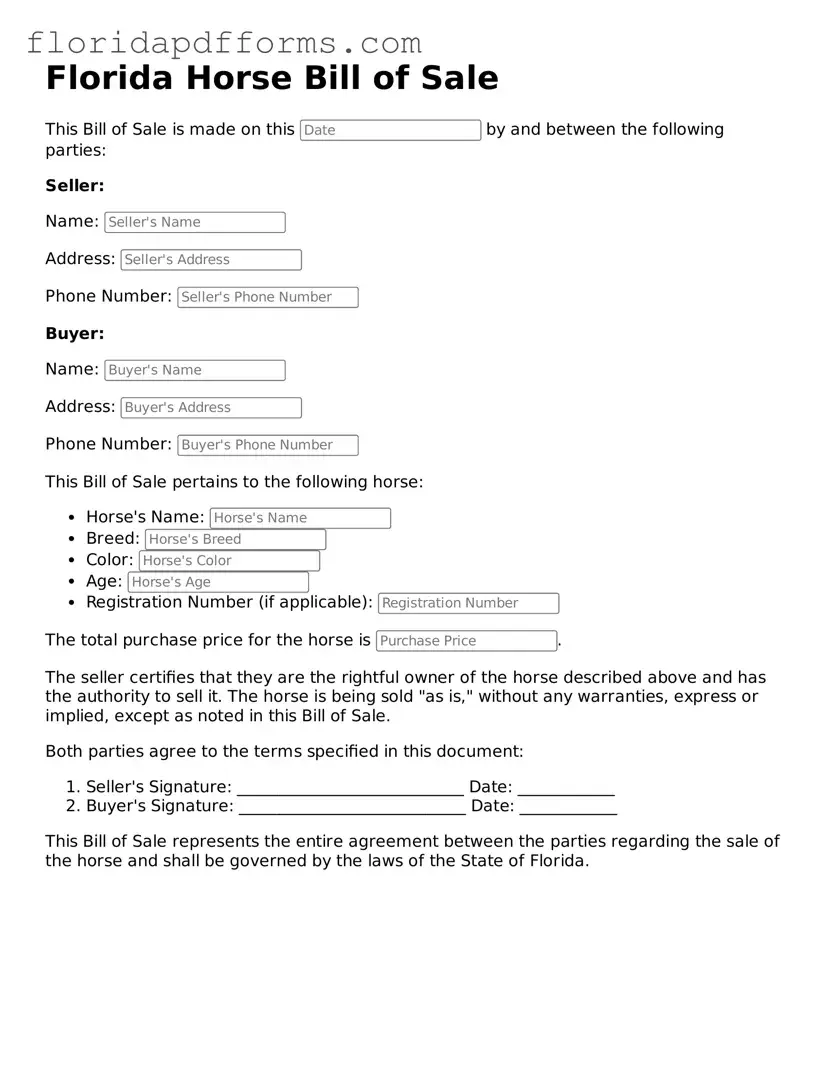The Florida Horse Bill of Sale form shares similarities with the Vehicle Bill of Sale. Both documents serve as proof of transfer of ownership from one party to another. They typically include details such as the buyer's and seller's names, the description of the item being sold, and the sale price. Just as a vehicle bill provides assurance to the buyer regarding the legitimacy of the transaction, the horse bill of sale does the same for equine purchases, ensuring that the buyer has a clear title to the horse.
Another document that resembles the Horse Bill of Sale is the Boat Bill of Sale. Like the horse bill, this document is used to record the sale of a watercraft. It outlines the seller's and buyer's information, the boat's identification details, and the agreed sale price. Both documents protect the interests of both parties and facilitate the legal transfer of ownership, ensuring that the buyer receives a legitimate asset.
The Pet Bill of Sale is also akin to the Horse Bill of Sale. This document is used when ownership of a pet, such as a dog or cat, is transferred. It includes similar elements, such as the names of the parties involved, a description of the pet, and the sale price. Both documents aim to provide a clear record of the transaction, which can be important for legal and personal reasons, including ensuring that the new owner has the right to care for the animal.
The Livestock Bill of Sale is another related document. This form is used for the sale of livestock, which can include cattle, sheep, or pigs. It contains details about the seller, buyer, and livestock being sold, mirroring the structure of the Horse Bill of Sale. Both documents serve to protect the rights of the seller and buyer, ensuring that the transaction is documented and legally binding.
The Equipment Bill of Sale is similar in function to the Horse Bill of Sale. This document is used for the sale of various types of equipment, such as farming or construction machinery. It includes essential details such as the parties involved, a description of the equipment, and the purchase price. Both bills of sale provide a clear record of ownership transfer, which can be vital for warranty claims or future sales.
The Motorcycle Bill of Sale also shares characteristics with the Horse Bill of Sale. This document facilitates the transfer of ownership for motorcycles, outlining the seller's and buyer's information, the motorcycle's details, and the sale price. Both documents serve to establish legal ownership and protect the interests of both parties involved in the transaction.
Finally, the General Bill of Sale can be considered similar to the Horse Bill of Sale. This document is used for a wide range of personal property transactions, detailing the sale of items such as furniture, electronics, or collectibles. Like the Horse Bill of Sale, it includes the names of the buyer and seller, a description of the item, and the sale price. Both documents provide a formal record of the transaction, which can be beneficial for both parties in case of disputes or future ownership verification.

